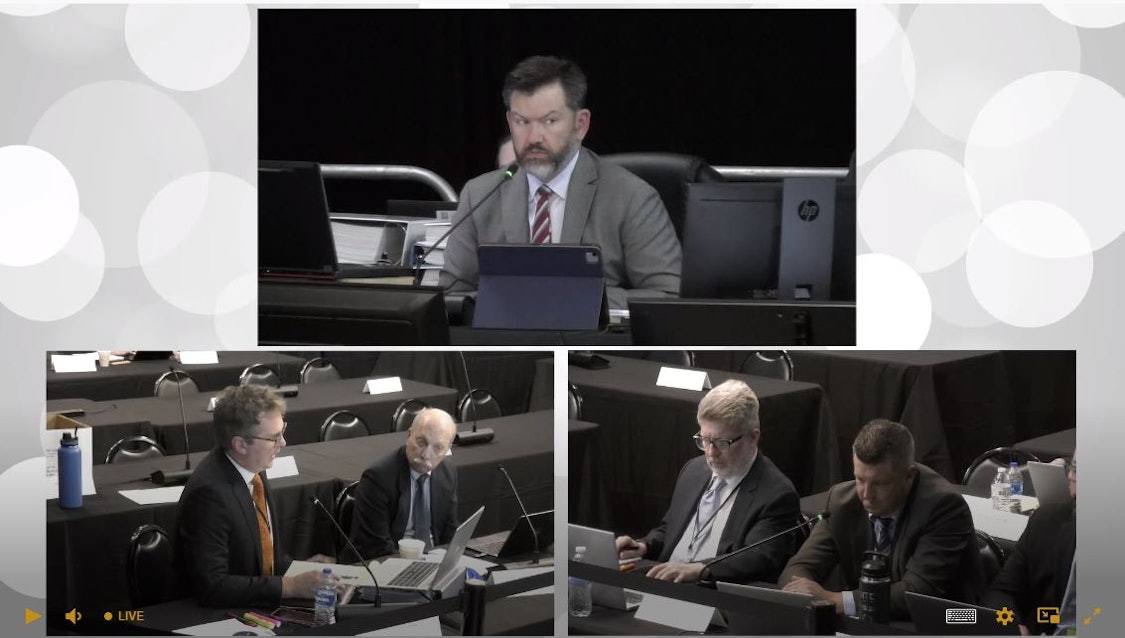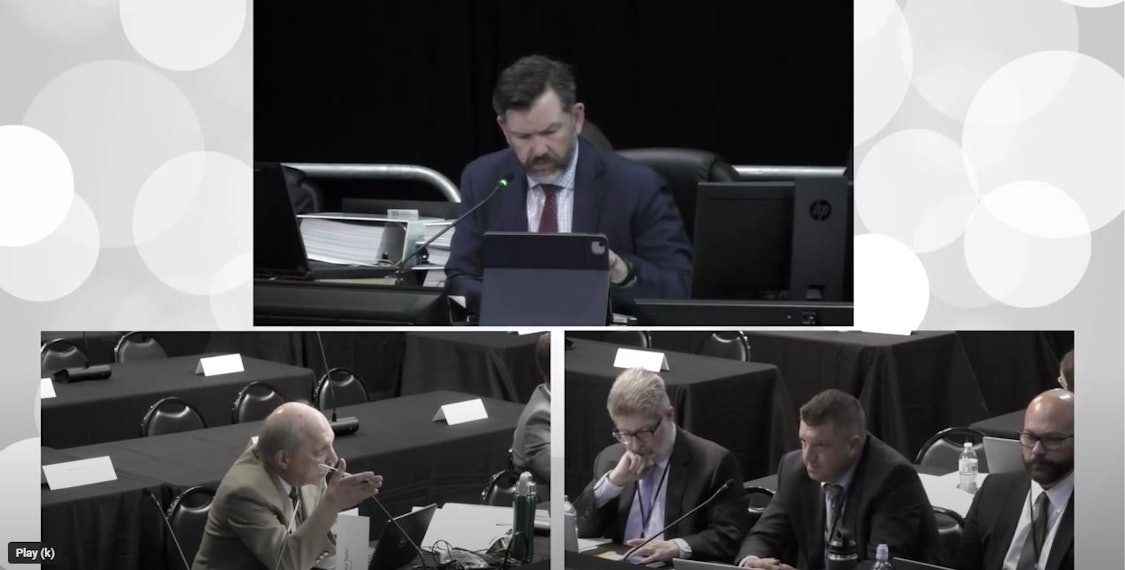Nancy Dugan lives in Altoona, Iowa and has worked as an online editor for the past 12 years.
A North Carolina attorney is conducting mediation sessions the Iowa Utilities Board has facilitated between Summit Carbon Solutions and landowners on the company’s proposed CO2 pipeline route, the board’s general counsel confirmed to Bleeding Heartland.
Shortly after becoming Iowa Utilities Board chair on May 1, Erik Helland presided over a June 6 status conference related to Summit Carbon Solutions’ CO2 pipeline project. Foremost on his agenda was the new, experimental idea of offering mediation to landowners and Summit Carbon representatives. Helland explained:
Also included in the May 19 order was a proposal about potentially using mediators to assist voluntary landowners with the easement negotiation process. The Board stated it was exploring this idea and would seek input from the parties at this meeting.
Attorney Timothy Whipple, who represents seven Iowa counties in the Summit matter, explained during the June 6 conference that Iowa Code chapter 479B does not provide a framework to address the board’s authority over voluntary easements, stating the counties’ preference to adhere to a traditional contested case hearing.
Similarly, Sierra Club attorney Wally Taylor urged the board to consider Iowa Code section 479B.1, which “clearly says the Board’s priority is the rights of the landowners, and that’s what we need to be concerned about.”
Summit Carbon attorney Bret Dublinske said the company took no position on mediation. “It obviously is a bit of an experiment that hasn’t been done in prior proceedings,” Dublinske added. “If the Board believes that that is a worthwhile endeavor and the Board believes that that will be helpful, we are certainly happy to participate and, you know, to make ourselves available as necessary for those.”
Consumer Advocate Lanny Zieman was quick to assure the board that the Office of Consumer Advocate also had no position on mediation “as long as the process is purely voluntary as represented.” Zieman added, “And we do not intend to participate in that process.”
Helland and Zieman subsequently engaged in the following exchange:
Helland: Okay. Okay. Thank you. And mute my mic if I’m getting out over my skis, Jon – he gets nervous when I say that. You know, when we discuss a voluntary mediation program, in our mind, you know, because obviously, you know, we can’t discuss, you know, outside the presence of other parties, I don’t think there’s a logical role for OCA as a party to the case as a whole. I mean, we certainly – internally we’re not opposed, we just didn’t see – because realistically there’s just probably not a role in that mediation, correct, between two other parties?
Zieman: Correct.
Helland: Okay. Thank you. Anything else to add?
Zieman: Nope.
MEDIATION SCHEDULED DURING SUMMIT EVIDENTIARY HEARING
Statements made during the September 7 and 12 evidentiary hearings in Fort Dodge confirm that at least one mediation has taken place while the hearings are ongoing. On September 26, in response to questions posed by Bleeding Heartland, the board’s general counsel Jon Tack indicated that attorney Frank Laney of Carolina Dispute Settlement Services, which operates out of North Carolina, is conducting the mediations.
That company also offers Medicaid mediation, one of Helland’s areas of expertise through a business formerly known as 49th Summit Solutions, which now goes by the name Blueprint Resolutions. A pdf of a Medicaid pilot study featured on the Blueprint Resolutions website, which identifies Helland as the mediator, indicates the study was modeled after the Mediation Network of North Carolina’s Medicaid mediation program.
It is not clear whether Helland retained ownership of Blueprint Resolutions following the company’s name change, or if the business has more than one owner. A September 27 search of Secretary and Department of State websites in Alaska, Iowa, and Delaware did not yield results for the business name Blueprint Resolutions. To date, 49th Summit Solutions, which was formed in Alaska, has not registered a name change in that state.
At this writing, the Iowa Utilities Board has not answered Bleeding Heartland’s questions about why the board hired Laney to conduct mediation sessions to aid Summit Carbon in securing easements with landowners. According to Tack, Helland and Laney are not affiliated with each other.
“Mediation is a voluntary option and not relevant or admissible in the evidentiary hearing,” Tack wrote in a September 27 email to Bleeding Heartland. In answer to an inquiry about costs, Tack wrote, “Pursuant to Iowa Code section 476.10, costs incurred in IUB proceedings are assessed to participants in those proceedings.”

Testimony during the September 27 evidentiary hearing continued late into the evening
Iowa Code section 476.10 does not mention mediation. In addition, Tack’s comments diverge from statements Helland made on June 6: “We want to clarify this service would be completely voluntary on an individual basis and would be offered free of charge to the landowners who elect to do it,” Helland said, stating further, “Costs are ultimately attributed back through the Board on an hourly basis to the utility.”
During the September 7 hearing, Summit attorney Bret Dublinske explained why Micah Rorie, Summit vice president of land and right of way, was not available to testify: “We were thinking we would run a little later today, but the issue with Mr. Rorie is he actually is participating late today in a mediation as set up by the Board.”
BOARD IMPOSES CONFIDENTIALITY RESTRICTIONS
During the board’s September 12 evidentiary hearing, the Sierra Club’s attorney Taylor asked Summit VP Rorie about the September 7 mediation:
Q. Last week Mr. Dublinske mentioned that you were in a mediation. Was that with a landowner?
A. It was.
Q. And who was – I’ll rephrase that. Without mentioning any names, what – who was involved in that? I mean, you and a landowner, I assume?
A. Yes.
Q. And a mediator?
A. Yes.
Q. Anybody else?
A. No, no. There’s two parties and a mediator.
Q. Okay. And is the mediation what the Board suggested that landowners could engage in?
A. That’s right.
Q. And how many of those have you done or has Summit done?
A. I need to probably get some advice on how much I can talk about that. The mediator has told me specifically that the progress, the volume, the contents of those mediations are strictly confidential, as instructed by the Board. You’re welcome to ask the Board if I can talk about that, but I need to follow the rules I’ve been told.
Q. I wasn’t asking the content. I wanted to know how many mediations you have had.
A. How many is content. I would ask you to ask the Board if I can answer that question. If they feel like I should, I absolutely will. I don’t want to break rules here.
Mr. Taylor: Mr. Chair, may he answer that question?
Board Chair Helland: I think he can speak to the volume, if Mr. Rorie knows.
A. Could you restate your question?
By Mr. Taylor:
Q. How many of these mediations have there been?
A. Five or six.
Q. Okay. Have any resulted in an easement?
A. Well, we’re right there again, Mr. Taylor. I assume we can’t answer that for you.
Mr. Taylor: Mr. Chair, may he answer that?
Board Chair Helland: Mr. Taylor, he really can’t be speaking about the outcome of the mediations.

Sierra Club attorney Wally Taylor and Summit Carbon attorney Brant Leonard spar over witness testimony during the September 26 proceeding
During the September 26 hearing, Summit attorney Brant Leonard objected to Taylor’s questioning of witness Bob Van Diest, arguing that the board has no role in overseeing voluntary negotiations:
Taylor: What kind of contacts and discussions did you have with Summit’s agents or representatives?
Van Diest: I mostly told them that I was not interested and I was objecting to the eminent domain. I was concerned about my tile lines. I told them we just didn’t have much to talk about.
Taylor: Did you try to negotiate any terms with them or any alternate routes?
Leonard: Objection your honor.
Helland: State the objection.
Leonard: This goes beyond anything specific to Mr. Van Diest’s parcels and gets into the parties’ voluntary negotiations, which are not something the board has a role in overseeing.
To sum up: mediations are taking place before the Iowa Utilities Board has decided whether or not the Summit Carbon project serves a valid public purpose. As Summit’s Leonard argued on September 26, the board has no role in overseeing voluntary negotiations.
His point raises an important question: Is the board acting outside the bounds of its statutory authority by facilitating mediations between landowners and Summit Carbon, with the stated goal of securing voluntary easements?
Top image of Lady Justice or Themis is by icedmocha and available via Shutterstock.


2 Comments
Thank you, Nancy Dugan, and thank you, Wally Taylor
The tentacles of this thing are incredible, and the waters are very murky. And apologies to Class Cephalopoda for that metaphor.
PrairieFan Thu 28 Sep 5:10 PM
an understanding
So, let me get this straight. A corporation seeking permits in the state of Iowa for building carbon capture and storage systems without storage facilities and seeking eminent domain authorization, taking private lands to do so, is in hearings right not for that determination. No permits have been granted in Iowa and are subject to the hearing in progress, and multiple permits have been denied to the same corporation in other states. This corporation is getting facilitation for land acquisition obscuring the public support of the project by the chairperson of the utilities board presiding over the public hearing now in progress and is one of three votes needed to grant authorization for the corporation permits to proceed. Did I understand that correctly?
Liza Mae Sat 30 Sep 12:01 PM